| . |
. |
. |
Confessional Self-Portraits
E. Stoepel Peckham
(four etchings—*larger view*)
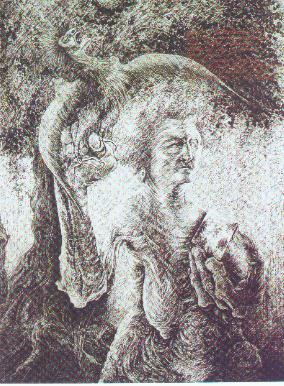 I: Alzheimers
I: Alzheimers
Gnarled as the centurion olive
Tough and rooted deep enough
To be inured to drought
Whether of sky or spirit—
Maybe blind
Or only inward looking
Refusing to see death in the mirror
Or hear the familial siren
Crying madness in her mind.
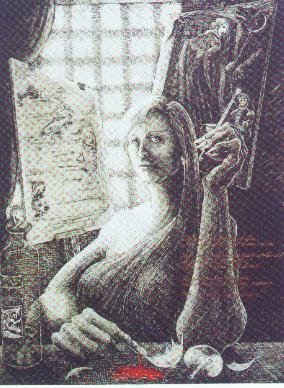 II: Liar
II: Liar
Portrait in light and lies
Showing what she'd have us see.
but in the mirror as much veritas est
As once was in the botttle
Where now there's only threat.
The beastmistress's mask
Hides tears for monkey memory.
Only blood's a distraction.
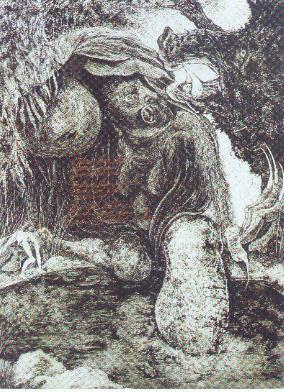 III: Beast
III: Beast
Without the rags
Woman becomes
Just another beast.
Feathers, whiskers, scales
Fangs and claws
Become her.
But cloth a flimsy
Cave creates. She'd best
Nurture the bestial in her.
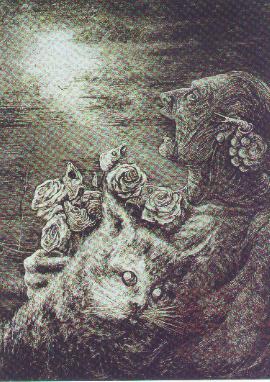 IV: Poet
IV: Poet
What lament is this old trout
Braying at the moon?
What secrets does the snail whisper?
What secrets does the cat keep?
Her face is veined like a spider's web.
For whom is the bouquet of fish heads and roses?
Euphoria rides at rest.
Singing, she swallows the night.
~ .
Self-Portrait
Charles Pierre
For an interminable moment, I
have been sitting here peacefully among
the objects of my room: table and chair,
a sheet of white paper, and in my hand,
a silver pen. There's a sense of wholeness
within me now and it seems to extend
throughout this space. The stillness of shadow
and light on the walls are nothing apart
from all that is visible. The small lamp
in the corner has been useful to me
at times when books were my only release,
but tonight my eyes, shaded by dark lines
of sleeplessness, are resting in a soft glow
whose origin is nowhere to be seen.
(Prior publ.: Parnassus Literary Journal and Green Vistas,
a collection by the author.)
~ . ~
Steerage
Charles Pierre
Alone in my berth, through continuous night,
with only this rusted hull between me
and the sea's surge, I have neither red skies
of dawn and dusk nor the stitches of starlight
for bearings, just a dull pulse of engines
and blurred memories of the freighter's stacks,
their black smoke erasing my native bay.
In the dark folds of my hands, the lines
of life and heart and mind that intertwine
across my palms proffer no key to the time
and space through which I move. And the sea
washing over me, so long a wet redemption,
only fuels the fires of loss and confusion
consuming the home beneath my breastbone.
~ . ~
Reflection
Charles Pierre
The man who looks back at me, alone before the mirror,
stretches his arms and legs, expands his chest and shoulders,
before diving once again into the waters of boyhood,
the loose skin and wrinkles vanishing from his body
as he begins to swim with a fluency that makes him feel
at one with the sea, at one with the element he was born to,
the waves sluicing and shimmering along his muscled limbs,
the clouds passing in cool feathers of shade across his back,
the breeze tickling the hairs on his wrists as they rise and fall
with his overarm stroke, the drops of water on his lashes
catching the light of noon and bursting in sunspots,
the world of his early years reassembling itself in the mirror,
the glass giving back to him the young athlete who lived
so completely in his season that he and his image were one.
(Prior publ.: Aethlon: The Journal of Sport Literature)
~ . ~
Self-Portrait, Ending With Neruda
Sam Rasnake
1.
The vanishing tribe of the body hates
and loves the body with an ache so tiny
the world dies. They gather
all their things onto backs of animals,
wearied with the need, long column
by long column, for the migrations
into darker regions, worn thin
under footfall, over rivers starved
to rock beds. There used to be wolves
in those parts. And snows, magnificent—
jagged edges of grace under thick skies.
2.
This then is history: the guessing,
no one saying anything, bamboo in a bowl,
bending, the hushed slide of clouds
over mountains and the meadowlark's throat
calling down autumn. The anthropology
of the moment is shadows across the couch,
photographs and piano, a mirror to end the hall,
footsteps. This is what I carry. This is
what I breathe. When I close my notebook,
the ink dries in secret.
3.
But we hover now, plate to plate.
Exhausted in the doing,
we tongue-to-roof-of-mouth our l's,
salt and pepper to taste, then eat
the holier portions, such a carnal enterprise.
The cave paintings we leave, though undisturbed,
would tell a story, smoothed over stone,
of those certain dark things beyond music.
~ . ~
Monster Island
Brad Ricca
What it comes down to is a lack of
tickets and/or
good transportation.
The gulf is just too wide,
too green and churny.
Not even a strong British woman
named "Beauty"
could swim it.
Not in the tightest of caps.
So, majestically then, like the
Eiffel Tower
on a rainy, August day,
the air filled with crepes,
Godzilla rises up
all thirty stories of green scale and cheap
dimpled rubber, depending how you
look at it.
And smiles: with fire licking the corners of his
mouth like so many flowers and
fireworks.
This mock the use of subtitles.
Where he comes from:
a cancerous island
where the giant crabs walk
like they own the place.
And the giant praying mantis
questions everything.
So he leaves, even though
the two whiny Japanese girls
cry for all their might: arrayed
with beads and feathers they
wail.
Like bicycle horns
or wheezy, asthmatic grandmothers.
In Paris, Linus Pauling
shakes his spotted fist at you,
and the Curies smile
in horrible unison.
~ . ~
Patinir's St. Jerome
Tom Savage
On the way to my St. Jerome library,
I step on red paint in the subway
And carry it a short way toward the train.
Red is the color from the sky
I remember most in Patinir's great painting
Where Jerome, who became a saint mostly
For translating the Bible, sees a rock
Which reminds one of the chest
He must have beaten endlessly in frustration.
Baring breast, beating, and shouting, "Alas."
Sounds like a chapter from my life
Which rarely ends, but has its intermissions.
Sometimes I have encountered joy
In or near the Met Museum Watson Library
Where I hunt books by title or number.
Talk of judging book by cover, this is…
There goes my internal non-saint Jerome, again,
Plainting away about what he does and doesn't have
Amidst a strangely Chinese-looking landscape
On his knees and out in the heat, as usual.
At least, the camels know how to smile.
Wake up the heart, St. Jerome. Your self-pity
Hour ended when you woke this morning and asked, "Why?"
Cover your chest again and leave that rock alone.
The sky has your number, now. So do I.
You only became a priest at others' insistence.
You said it wasn't your vocation, but obeyed.
During a four-year-long vacation from America,
I wanted to become a Theravadin Buddhist monk
And applied. I was told epileptics were barred
From all but novitiate service to the Void.
Your impasse was the reverse of mine.
But I commend your rigor
Even if it led you to this tree-y outcrop where I see you.
Your anguish looks strangely calm as you kneel.
Will you accept my hands and arms to raise you?
The sky and those camels await us. Come along.
~ . ~
Inspired by Browning
Daniel M. Shapiro
Ghosts fly in and out of your full-spectrum sideshow,
But you shrug your shoulders and refuse to fear them.
If clenched memories of chilled winters linger,
They might as well stretch out in bleacher seats
And watch beauty take shape under the tent.
Your own form disgusts you sometimes
Because you consider only its limits.
In your mind you are an eternal worm,
Meandering through dirt that chokes you.
You wonder how you can keep going
When gravity should bring down earth
And smother you in the brave path you've dug.
But each time you emerge from a tiny hole, as you must,
I see the real you, stunning despite incompleteness,
Randian, the Hindu Living Torso, a fiery optimist
Who has no need for conventional arms or legs.
You perform your circus-freak majesty for me,
Lighting a cigarette with only your skilled lips. Despite
All the labor it takes, you selflessly pass the smoke to me,
Eager to share energy stronger than a hundred embraces.
(Daniel M. Shapiro, a contributor to the Apr '03 feature on music, has written about music, film, and television for newspapers in the Midwest and in Arizona, where he lives now.)
~ . ~
Self-Portrait as Interstate 10
Susan B.A. Somers-Willett
Still, the sky is the great equalizer.
Still, I yawn into the visible: yellow sun,
shack, mountains of uncertain
range. What gives life
are two directions: to and away like a decisive
heart. The saguaros wave
in the way of surrendering bankers.
What is it to be a sign, a coffee cup,
the grave of a doll's discarded leg?
I end, I begin, I have known death
and have doubled back. I am the last
gas station on its three stilts rising
out of the sea, or the child born there.
To hear the ocotillo burst
into white laughter after rain.
To be the keeper of distances,
defined by landscape and trash.
To the foal of cows in spring
and the crossing corpses of Texas,
I say, Come unto me. Leave.
Here a cross marks the earth
where three sisters have buried
their animal. Here the dung of a beast
grows sweet to dry in the sun.
To know not night,
but the fading of a lamp. To live
the constant grey of a bayou.
And here, in L.A., here, in Florida,
here in Lake Charles,
towers of sulphur flicker and that hell
singes its lit I's against the good
white clouds. Here swamp, bay,
monument, tin can with a mouth
ragged as a Southern woman and I
am her spine pressed to the bedsheet.
There is no home, only postcards.
No relationship not marked by distance.
Of all things, I am the same
photograph taken at different
times of day: me, the lyric
of truck tires in a deluge or
me, those years of dark
water in a plant's heart or
me, that small animal
blooming in a hawk's fist
not drowning, not waving,
but falling out of the sky.
(Poem was selected as a semifinalist in the 2002 Lyric Recovery competition.)
Susan B. Anthony Somers-Willett spent her formative years in New Orleans, Louisiana and now resides in Austin, Texas where she received a Ph.D. in English and an M.A. in Creative Writing at the Univ. of Tx - Austin. She has competed nationally as a slam and performance poet, and her poems have appeared in Hayden's Ferry Review, Spoon River Poetry Review, Beloit Poetry Journal, and Earth's Daughters. She has also served as a co-editor of Borderlands: Texas Poetry Review and won The Madison Review's 2000 Phyllis Smart Young Prize in poetry.)
~ . ~
Self-Portrait In Sand
Susan Terris
1) Mermaid's Lament
When wind and wave erased the merman in the sand,
iceplant touched me with fleshy fingers,
offered a bed to lie on and a yellow flower
with narcotic sweetness
to ease the ache and put me to sleep.
2) Time And Tide
Keening, I knelt on a rock with my mirror and combed
sleep-snarled hair
as the tide came in. But sand and wave
and darkness assaulted me, stole
my song and my tale as the tide came in.
3) Fugitives
In the kelp forest, where sand sharks needled past
and jellyfish pulsed like hot air balloons,
the merman and I clung to one another,
banished fugitives
from a world where tide and time hold sway.
~ .
Self-Portrait In Water
Susan Terris
The tide turns at the mouth of the lagoon
like an hourglass poised in the hands
of someone who is out of time,
someone looking not forward
but backward with regrets.
When the tide turns
its surface is inert like the skin
of a woman who has lost herself,
all motion stilled,
the grain unwilling to shift.
But after the tide turns
dark salt water begins to pulse and flow
as it does in fingers of a woman
who holds her heart in her hands,
as it does in the throat
of a woman who has a song to sing.
(Susan Terris's book, Fire is Favorable to the Dreamer, has just been published by Arctos Press. In 2004, Gary Metras at Adastra Press will publish a letterpress edition of her chapbook, Poetic License, and Marsh Hawk Press will publish her third full-length book, Natural Defenses. Other recent books of poetry are: Curved Space(La Jolla Poets Press, 1998) and Eye of the Holocaust (Arctos Press, 1999). Recent fiction: Nell's Quilt(Farrar, Straus & Giroux). Her journal publications include The Antioch Review, The Midwest Quarterly, Ploughshares, Shenandoah, Missouri Review, Lynx Eye, and Southern California Anthology. She edits an annual anthology, Runes: A Review Of Poetry, with C.B. Follett. Other work appears in the Mar '03 'Departures' feature.)
~ . ~
Making Monsters
David Thornbrugh
Director James Whale
improved on Mary Shelley's story
by making the monster's first murder
an act of mistaken love.
After he escapes the laboratory,
the monster meets a little girl,
the first person he doesn't repel,
and copies, clumsily, the game she plays
of plucking flower petals
and throwing them into a lake.
Empathy doesn't come naturally
but must be taught by example,
the way, in the movie, we make the jump
to the next scene of the peasant wedding
falling silent as Hans shuffles in, blank-faced,
drowned daughter lying limp in his arms.
Monsters exist, but not because
they're cobbled together by scientists
cackling under the curling bolts of blue
electricity lighting up the laboratory,
but in the bad faith gestures
our leaders use to fend off history,
to shock the staggered horses of our hopes
back into the burning barn.
(David Thornbrugh has lived in Japan and wandered Southeast Asia, but now lives in Seattle, where he works as a technical writer. This is his first appearance on the magazine.)
~ . ~
Self Portrait: The Man Who Bounces Eggs
Martin Willitts, Jr.
1.
This is how it begins. It begins with eggs.
There is this wrinkled black and white picture.
In it a boy holds a basket of colored eggs
Wearing a hat. The kind of hat you see in old movies
When the detective says who did it.
The kind of hat, if you put a card in the hat band
He could be a kid reporter like Jimmy Olsen.
He is wearing a Brownie camera with a strap.
This is an old box camera they don't make anymore.
This dates the picture. The old browning corners
Date it even more, to a time when cameras
Snapped moments like this, indelible, permanent
And the shape of the picture is oval.
The striped eggs are hard boiled like the detective
Tipping his hat to the whiteness. Here's looking at you, Kid.
The clicking of the camera is the high heels walking away.
This is how it begins. An egg is falling from the basket,
Held in mid air, like a reporter's question, held
In the camera's eye as wrinkled as the moment, forever.
2.
This is the Blues mandolin. It is flat backed, not curved.
It has a resonated metal plate. When played, notes tingle
High blackbirds summoning the mourning.
When he no longer could hear the music, he quit
mid-note, a whole note, a fat goose egg, ready to bounce
In the listener's ear, soft, as in Easter egg grass.
He cannot detect that last note. It has not been reported yet.
When it echoes back, it is detected as a crime scene photo
And the mandolin resonates with accusations.
3.
He did not want to write the paragraph.
The typewriter pounded like a headache.
He did not want to write the paragraph
So it wrote itself.
It was his life story, his full confession.
It balanced on its end like an egg in salt.
And when no one was looking, he changed the meaning.
4.
Love is a blue speckled egg
5.
Everyone waited for the wolf to be a wolf
Never thinking he might be innocent.
So they kept a private eye on the wolf
But nothing happened: No eggs were missing.
Still the evidence was immense. He was a wolf
And he would always be a wolf
No matter how dependable
No matter how safe the eggs.
6.
Take a carton of eggs. Common
Ordinary, grade-A eggs. The kind
You color rainbows on. That kind.
The secret is: one egg is rigged
Like a carnival game is rigged,
Like a trial is rigged or a clue is rigged,
That kind of rigged. The others
Are normal and content as yesterday's picture.
Even a picture can be faked, easily.
Nothing up my sleeve. Watch this:
Pick an egg, any egg. Now, drop it.
Watch it scrabble, splat! like crime blood.
Now watch the bouncing egg.
7.
This is how the secret works:
You immerse the egg in vinegar
All night. Too long and it will ooze
And drool like a drunk. Too short
And it will still splat. It's all in the timing.
This is how the secret works:
Most crime goes undetected.
This is how the secret works:
When the film is developed and emerges
The past, present and future, all at once
This is how it always works.
When we look at this moment
It will be all three at once;
This still portrait, this stilled life
It resonates with the music from the mandolin
8.
This is my self-portrait
Do with it what you will.
|

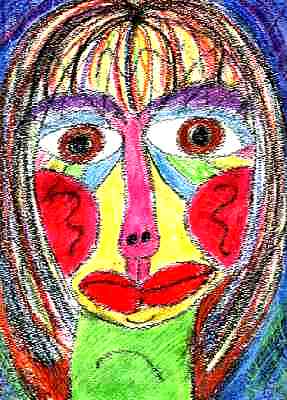 B
B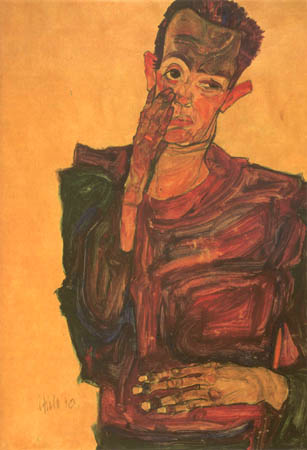 A
A I: Alzheimers
I: Alzheimers II: Liar
II: Liar III: Beast
III: Beast IV: Poet
IV: Poet